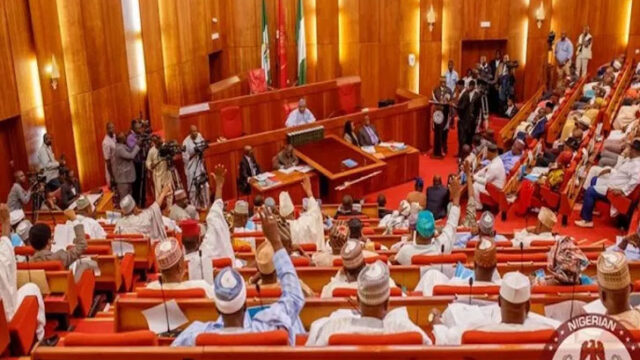Lawmakers agreed that despite constitutional safeguards, fair representation across ethnic, linguistic, religious, and geographic lines remains elusive.

The senate has commenced an investigation into the systemic abuse of the federal character principle in recruitment, promotion, political interference, and uneven infrastructural development across ministries, departments, and agencies (MDAs) in the country.
The probe also seeks to assess compliance with Sections 14(3) and 14(4) of the 1999 Constitution (as amended).
The resolution followed a motion moved by Sen. Osita Ngwu (PDP, Enugu west) during Tuesday’s plenary, where he expressed concern over the persistent challenges in achieving equity in Nigeria’s public service.
He highlighted issues such as limited recruitment opportunities, promotions driven by years of service rather than merit, and a lack of mobility for workers outside the public sector.
In his lead debate, Sen. Ngwu noted that despite the federal character principle enshrined in the 1999 Constitution, which mandates fair representation reflecting Nigeria’s linguistic, ethnic, religious, and geographic diversity, imbalances persist in federal appointments.
He stressed that Section 14(3) and (4) of the constitution clearly prohibits the dominance of persons from a few states or ethnic groups in the federal government or its agencies. However, he observed that despite efforts to apply geographical quotas, certain regions remain marginalised while the imbalance simply shifts between institutions.
The senator further lamented that institutional inertia and weak accountability have worsened the problem, with senior-level recruitment increasingly influenced by internal preferences rather than merit and fairness. According to him, the quota system has blurred the lines between merit-based recruitment and equitable state representation, undermining discipline, morale, and institutional efficiency.
“The constitutional criteria for equitable distribution of employment which requires that each state contributes its proportionate quota of 2.75% of the national workforce; and the Federal Capital Territory (FCT) to account for 1.00% of the workforce; while catchment areas are to address localized recruitment for junior staff up to 75% of positions.”
Regrettably, he said, several institutions of government, including the Nigerian National Petroleum Company Limited (NNPCL) and its subsidiaries, the Nigerian Upstream Petroleum Regulatory Commission (NUPRC), the National Agency for Food and Drug Administration and Control (NAFDAC), the Nigerian Ports Authority (NPA), the National Pension Commission (PENCOM), the Nigeria Deposit Insurance Corporation (NDIC), and others have repeatedly violated the federal character policy, bypassing recruitment regulations.
Ngwu said there is evidence to support these claims.
He warned that continued disregard for these constitutional provisions could undermine the powers of the National Assembly as outlined in the Legislative Houses (Powers and Privileges) Act, 2017, the Subsidiary Legislation 23 of 1997, and the Freedom of Information Act, 2011.
The senate also expressed concern over the ineffectiveness of the Federal Character Commission (FCC), which it blamed on chronic underfunding, political interference, and limited enforcement capacity.
The senate directed its committee on federal character and inter-governmental affairs to thoroughly investigate the matter and report back within three months with findings and recommendations to ensure compliance with the federal character principle in appointments, promotions, recruitment, and infrastructure distribution across over 900 MDAs.




